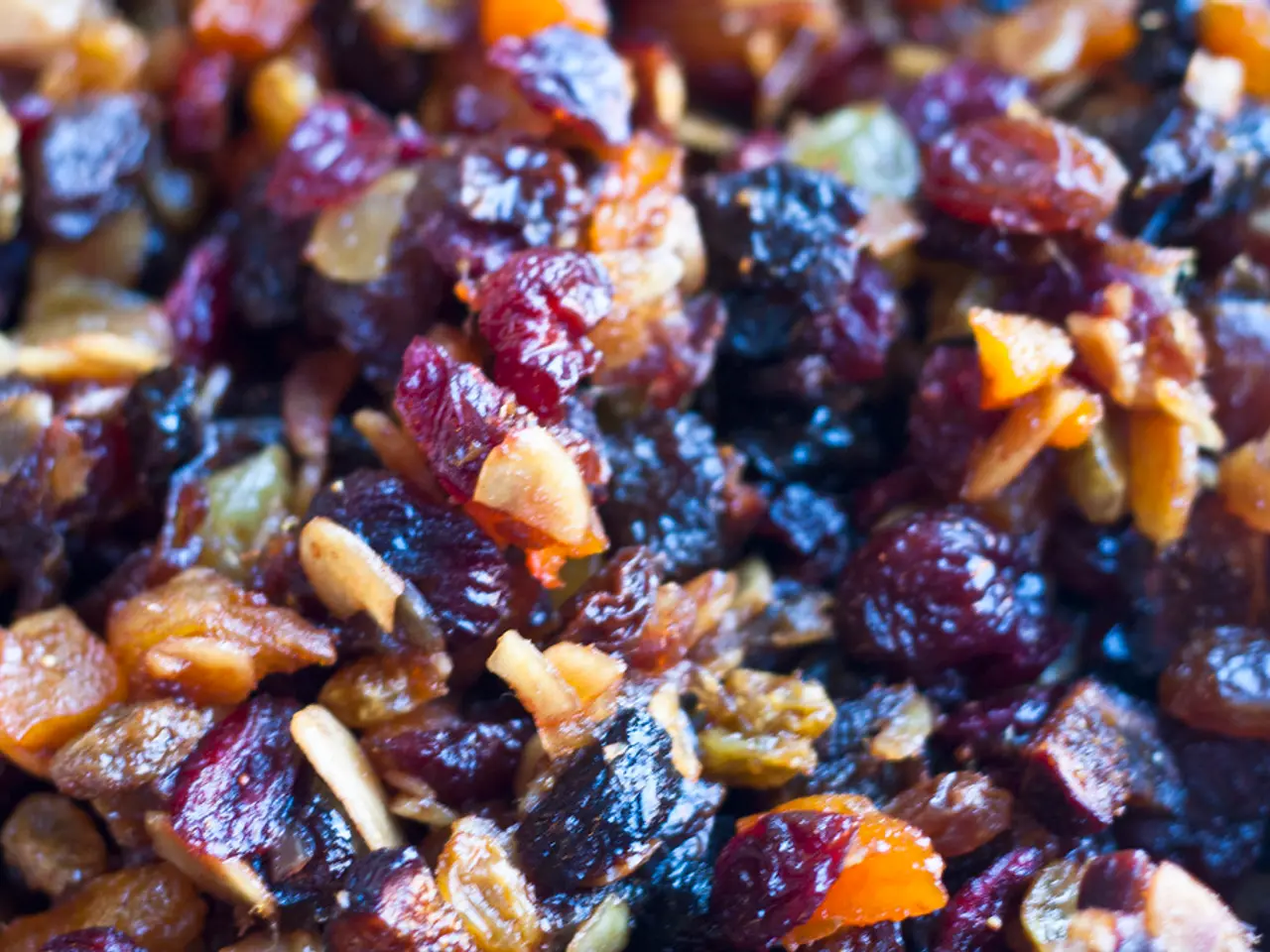Food choices and insulin resistance management: Suggested foods and dietary advice
Insulin resistance, a condition where the body's cells struggle to effectively use insulin, can be managed through dietary changes. By focusing on specific food groups and dietary approaches, individuals can improve insulin sensitivity and reduce blood glucose spikes.
Firstly, incorporating lean proteins such as meats, poultry, fish, and eggs into the diet can help maintain stable blood glucose levels. Low-fat dairy products like yogurt and cheese are also beneficial, as they add protein while keeping saturated fats low. Nuts and seeds, rich in healthy fats and fiber, are another great addition to the diet, supporting insulin sensitivity.
Fatty fish, like salmon, should be consumed twice a week due to their high omega-3 fatty acid content, which is beneficial for heart health and insulin sensitivity. Low-glycemic fruits, such as berries, apples, and pears, are also recommended, as they are low in fructose and have a lower glycemic index.
Dietary approaches like the Mediterranean Diet, Low-Carb Diet, and High-Protein, Low-Sugar Diet can also aid in managing insulin resistance. The Mediterranean Diet, focusing on plant-based foods, whole grains, fish, and healthier fats, is particularly effective in managing blood glucose levels.
In terms of supplements and nutrients, Glutamine, Vitamin C, Vitamin D, and Zinc are all crucial for insulin function and insulin sensitivity. It's important to note that while these supplements can be beneficial, a balanced diet should remain the primary source of nutrients.
General tips for managing insulin resistance include avoiding processed foods high in sugar and saturated fats, staying hydrated, and consulting a dietician for personalised dietary advice, especially if you have prediabetes or diabetes. Regular physical activity is also essential for blood sugar regulation.
It's worth mentioning that certain ethnicities, such as African Americans, Hispanic people, Native Alaskan people, American Indian people, Native Hawaiian people, and Pacific Islander Americans, may have a higher risk of developing insulin resistance. Losing weight, if possible, can also reduce the risk of developing type 2 diabetes for some people with insulin resistance.
In conclusion, managing insulin resistance through diet involves a balanced approach, focusing on specific food groups, dietary approaches, and supplements that help improve insulin sensitivity and reduce blood glucose spikes. It's always recommended to consult a healthcare professional for personalised dietary advice.
- A balanced diet can establish a good foundation for treating insulin resistance, especially by focusing on lean proteins like meats, poultry, fish, and eggs.
- Low-fat dairy products, such as yogurt and cheese, can be beneficial for treating insulin resistance due to their protein content and low saturated fats.
- Nuts and seeds, rich in healthy fats and fiber, can support a healthy diet for those suffering from insulin resistance.
- Fatty fish, like salmon, should be consumed twice a week for their omega-3 fatty acid content, which is beneficial for heart health and insulin sensitivity.
- Low-glycemic fruits, such as berries, apples, and pears, are recommended for individuals dealing with insulin resistance due to their low fructose content and lower glycemic index.
- Dietary approaches like the Mediterranean Diet, Low-Carb Diet, and High-Protein, Low-Sugar Diet can aid in the management of insulin resistance.
- The Mediterranean Diet, focusing on plant-based foods, whole grains, fish, and healthier fats, is particularly effective in managing blood glucose levels.
- Supplements like Glutamine, Vitamin C, Vitamin D, and Zinc are crucial for insulin function and insulin sensitivity.
- However, a balanced diet should remain the primary source of nutrients, and supplements should only be used as a complement.
- Avoiding processed foods high in sugar and saturated fats is a general tip for managing insulin resistance.
- Staying hydrated is also essential for individuals managing insulin resistance.
- Consulting a dietician for personalized dietary advice can be beneficial, especially for those with prediabetes or diabetes.
- Regular physical activity is crucial for blood sugar regulation in persons with insulin resistance.
- Certain ethnicities may have a higher risk of developing insulin resistance, including African Americans, Hispanic people, Native Alaskan people, American Indian people, Native Hawaiian people, and Pacific Islander Americans.
- Losing weight, if possible, can reduce the risk of developing type 2 diabetes for some people with insulin resistance.
- Macular degeneration, a form of degeneration affecting the eyes, can be a complication of chronic diseases like diabetes, highlighting the importance of managing medical conditions such as insulin resistance.
- Other nutrition considerations for people with insulin resistance may include focusing on other food groups like whole grains, lean proteins, and fiber-rich vegetables.
- Prediabetes, a condition that often leads to type 2 diabetes, can be managed through a healthy diet and other lifestyle changes, including exercise and monitoring blood sugar levels.




